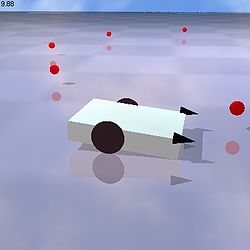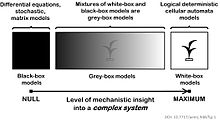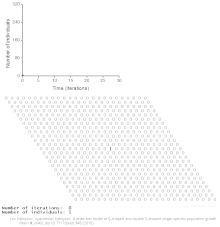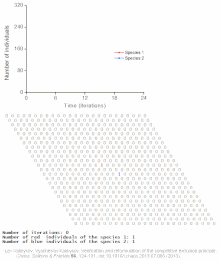人工生命 Artificial life
此词条暂由彩云小译翻译,未经人工整理和审校,带来阅读不便,请见谅。
Artificial life (often abbreviated ALife or A-Life) is a field of study wherein researchers examine systems related to natural life, its processes, and its evolution, through the use of simulations with computer models, robotics, and biochemistry.[1] The discipline was named by Christopher Langton, an American theoretical biologist, in 1986.[2] In 1987 Langton organized the first conference on the field, in Los Alamos, New Mexico.[3] There are three main kinds of alife,[4] named for their approaches: soft,[5] from software; hard,[6] from hardware; and wet, from biochemistry. Artificial life researchers study traditional biology by trying to recreate aspects of biological phenomena.[7][8]
Artificial life (often abbreviated ALife or A-Life) is a field of study wherein researchers examine systems related to natural life, its processes, and its evolution, through the use of simulations with computer models, robotics, and biochemistry. The discipline was named by Christopher Langton, an American theoretical biologist, in 1986. In 1987 Langton organized the first conference on the field, in Los Alamos, New Mexico. There are three main kinds of alife, named for their approaches: soft, from software; hard, from hardware; and wet, from biochemistry. Artificial life researchers study traditional biology by trying to recreate aspects of biological phenomena.
人工生命(经常被缩写为ALife或者A-Life)是在电脑系统中,通过仿真模型、机器技术和生物化学方式,模拟生命系统来研究生命的过程及其演变的领域。这个概念由美国理论生物学家克里斯托弗·兰顿Christopher Langton于1986年提出。1987年,兰顿第一次在新墨西哥州的洛斯阿拉莫斯 Los Alamos, New Mexico举行了该领域的第一次会议。 从研究方法的角度,可将人工生命研究分为三类: 1、软件模拟 2、硬件模拟 3、基于生物化学的研究 人工生命研究者尝试通过重现生命现象的各个方面来研究传统的生物学。

A Braitenberg vehicle simulation, programmed in breve, an artificial life simulator
用breve来编程的人工生命模拟 Braitenberg仿真小车
Overview 概述
Artificial life studies the fundamental processes of living systems in artificial environments in order to gain a deeper understanding of the complex information processing that define such systems. These topics are broad, but often include evolutionary dynamics, emergent properties of collective systems, biomimicry, as well as related issues about the philosophy of the nature of life and the use of lifelike properties in artistic works.
Artificial life studies the fundamental processes of living systems in artificial environments in order to gain a deeper understanding of the complex information processing that define such systems. These topics are broad, but often include evolutionary dynamics, emergent properties of collective systems, biomimicry, as well as related issues about the philosophy of the nature of life and the use of lifelike properties in artistic works.
人工生命研究人工环境中生命系统的基本过程,借此对定义此类系统的复杂信息进行更深入的理解。该研究角度涵盖深广,但通常会包括进化动力学、集体系统的涌现特性、仿生学、对生命本质哲学研究的相关内容,以及艺术作品中逼真的生物描绘。
Philosophy 哲学讨论
The modeling philosophy of artificial life strongly differs from traditional modeling by studying not only "life-as-we-know-it" but also "life-as-it-might-be".[9]
The modeling philosophy of artificial life strongly differs from traditional modeling by studying not only "life-as-we-know-it" but also "life-as-it-might-be".
人工生命的建模哲学,与传统的建模相比有显著差异,它不仅是研究我们“所知的生命”,而且去“研究生命可能的样子”。 人造生活的建模哲学与传统建模有很大不同,不仅研究“我们知道的生活”,而且研究“可能生存的生活”。
A traditional model of a biological system will focus on capturing its most important parameters. In contrast, an alife modeling approach will generally seek to decipher the most simple and general principles underlying life and implement them in a simulation. The simulation then offers the possibility to analyse new and different lifelike systems.
A traditional model of a biological system will focus on capturing its most important parameters. In contrast, an alife modeling approach will generally seek to decipher the most simple and general principles underlying life and implement them in a simulation. The simulation then offers the possibility to analyse new and different lifelike systems.
传统的生物学模型可能会集中捕捉某生物最重要的决定因素,与之相比,人工生命模型建模方法想要破译隐藏在生命体中最简单、最通用的规则和原理,并在模拟中实现它们。仿真为分析各种新出现的似生系统提供了可能性。
Vladimir Georgievich Red'ko proposed to generalize this distinction to the modeling of any process, leading to the more general distinction of "processes-as-we-know-them" and "processes-as-they-could-be".[10]
Vladimir Georgievich Red'ko proposed to generalize this distinction to the modeling of any process, leading to the more general distinction of "processes-as-we-know-them" and "processes-as-they-could-be".
Vladimir Georgievich Red'ko建议将这一本质区别推广至任意过程的建模中,从而概括出“我们所知的过程”与“他们可能是的过程”更加广义的区别。
At present, the commonly accepted definition of life does not consider any current alife simulations or software to be alive, and they do not constitute part of the evolutionary process of any ecosystem. However, different opinions about artificial life's potential have arisen:
At present, the commonly accepted definition of life does not consider any current alife simulations or software to be alive, and they do not constitute part of the evolutionary process of any ecosystem. However, different opinions about artificial life's potential have arisen:
近年来,学界普遍认为,任何系统或者软件都不能真正实现生命仿真,他们并不能构成生态系统进化过程的一部分。然而,有关人工生命潜力出现了不同的观点:
- The strong alife (cf. Strong AI) position states that "life is a process which can be abstracted away from any particular medium" (John von Neumann)[citation needed]. Notably, Tom Ray declared that his program Tierra is not simulating life in a computer but synthesizing it.[11]
- The weak alife position denies the possibility of generating a "living process" outside of a chemical solution. Its researchers try instead to simulate life processes to understand the underlying mechanics of biological phenomena.
- 强人工生命模拟方向认为(参见强AI),“生命是可以从任何特定的介质抽离的过程”(约翰·冯·诺伊曼)。值得注意的是,汤姆·雷(Tom Ray)宣布,他的程序Tierra不是模拟在计算机中的生活,而是对其进行综合。
- 弱人工生命模拟方向否认在化学溶液之外存在“活过程”的可能,研究人员转而尝试模拟生命过程,以了解生物现象的潜在机理。
Software-based ("soft")软件模拟人工生命
Techniques 技术
- Cellular automata were used in the early days of artificial life, and are still often used for ease of scalability and parallelization. Alife and cellular automata share a closely tied history.
- Artificial neural networks are sometimes used to model the brain of an agent. Although traditionally more of an artificial intelligence technique, neural nets can be important for simulating population dynamics of organisms that can learn. The symbiosis between learning and evolution is central to theories about the development of instincts in organisms with higher neurological complexity, as in, for instance, the Baldwin effect.
元胞自动机最早用于人工智能研究,至今仍常用于简化可扩展性和并行化的研究。人工生命与细胞自动机在早期有着相当紧密的联系。
- 人工神经网络有时被用来代替大脑建模。尽管传统上它更多地是一种人工智能技术,但是神经网络对于模拟可以学习的生物的种群动态非常重要。学习与进化之间的共生关系是对具有更高神经系统复杂性的生物(例如鲍德温效应)本能发展研究的核心。
Notable simulators 著名的模拟器
This is a list of artificial life/digital organism simulators, organized by the method of creature definition.
This is a list of artificial life/digital organism simulators, organized by the method of creature definition.
下表列出了按照生物定义方法整理的人工生命/ 数字生物模拟器。
| 姓名 | 驱动源 | 开始年份 | 结束年份 |
|---|---|---|---|
| ApeSDK(以前为Noble Ape)ApeSDK (formerly Noble Ape) | 语言/社会模拟language/social simulation | 1996 | 进行中 ongoing
|
| Avida阿维达 | executable DNA | 1993 | ongoing进行中
|
| Biogenesis生物起源 | executable DNA可执行 DNA | 2006 | ongoing进行中
|
| Neurokernel神经核 | Geppetto盖佩托(http://www.geppetto.org/)模拟平台 | 2014 | 进行中
|
| Creatures 生物 | neural net/simulated biochemistry神经网络 / 模拟生物化学 | 1996-2001 | Fandom still active to this day, some abortive attempts at new products狂热者一直活跃到今天,对新产品进行了一些失败的尝试
|
| Critterding | neural net神经网络 | 2005 | ongoing 进行中
|
| Darwinbots达尔文机器人 | 可执行的 DNAexecutable DNA | 2003 | ongoing进行中
|
| DigiHive | executable DNA可执行 DNA | 2006 | ongoing 进行中
|
| DOSE | executable DNA可执行 DNA | 2012 | ongoing正在进行
|
| EcoSim | Fuzzy Cognitive Map模糊认知地图 | 2009 | ongoing 进行中
|
| Framsticks 荧光棒 | executable DNA可执行 DNA | 1996 | ongoing进行中
|
| Geb盖布 | neural net神经网络 | 1997 | ongoing进行中
|
| OpenWorm | Geppetto盖佩托(http://www.geppetto.org/)模拟平台 | 2011 | ongoing进行中
|
| Polyworld多元世界 | neural net神经网络 | 1990 | ongoing
|
| Primordial Life原始生命 | executable DNA可执行 DNA | 1994 | 2003
|
| ScriptBots脚本机器人 | executable DNA可执行 DNA | 2010 | ongoing 进行中
|
| TechnoSphere技术圈 | modules模组 | 1995 |
|
| Tierra 铁拉 | executable DNA可执行 DNA | 1991 | 2004
|
| 3D Virtual Creature Evolution3D虚拟生物进化 | neural net神经网络 | 2008 | NA
|
Program-based程序模拟
Program-based simulations contain organisms with a complex DNA language, usually Turing complete. This language is more often in the form of a computer program than actual biological DNA. Assembly derivatives are the most common languages used. An organism "lives" when its code is executed, and there are usually various methods allowing self-replication. Mutations are generally implemented as random changes to the code. Use of cellular automata is common but not required. Another example could be an artificial intelligence and multi-agent system/program.
Program-based simulations contain organisms with a complex DNA language, usually Turing complete. This language is more often in the form of a computer program than actual biological DNA. Assembly derivatives are the most common languages used. An organism "lives" when its code is executed, and there are usually various methods allowing self-replication. Mutations are generally implemented as random changes to the code. Use of cellular automata is common but not required. Another example could be an artificial intelligence and multi-agent system/program.
基于程序的模拟包含具有复杂DNA语言(通常为图灵完整)的生物。这种语言通常是计算机程序的形式,而不是实际的生物DNA。汇编派生词是最常用的语言。生物体在执行其代码时会“存活”,通常有多种方法可以进行自我复制。变异通常是通过随机更改代码来实现的。元胞自动机是常见工具,但不是唯一的。也有人用人工智能和多线程系统/程序来进行研究。
Module-based基于模块的模拟
Individual modules are added to a creature. These modules modify the creature's behaviors and characteristics either directly, by hard coding into the simulation (leg type A increases speed and metabolism), or indirectly, through the emergent interactions between a creature's modules (leg type A moves up and down with a frequency of X, which interacts with other legs to create motion). Generally these are simulators which emphasize user creation and accessibility over mutation and evolution.
Individual modules are added to a creature. These modules modify the creature's behaviors and characteristics either directly, by hard coding into the simulation (leg type A increases speed and metabolism), or indirectly, through the emergent interactions between a creature's modules (leg type A moves up and down with a frequency of X, which interacts with other legs to create motion). Generally these are simulators which emphasize user creation and accessibility over mutation and evolution.
基于模块的模拟是将单个模块添加到一个生物中。这些模块或者通过硬编码模拟(例如腿类型A加快速度和新陈代谢)直接修改生物的行为和特征,或者通过生物模块之间的紧急交互作用间接地修改动物的行为和特征(例如A型腿以频率X上下移动,与其他腿部互动以产生运动)。一般来说,这些模拟器强调的是用户创造和可访问性,而不是突变和进化。
Parameter-based基于参数的模拟
Organisms are generally constructed with pre-defined and fixed behaviors that are controlled by various parameters that mutate. That is, each organism contains a collection of numbers or other finite parameters. Each parameter controls one or several aspects of an organism in a well-defined way.
Organisms are generally constructed with pre-defined and fixed behaviors that are controlled by various parameters that mutate. That is, each organism contains a collection of numbers or other finite parameters. Each parameter controls one or several aspects of an organism in a well-defined way.
生物体通常是由一系列预先定义的固定行为来构建的,这些行为受各种变异参数控制。也就是说,每个生物体都是一个包含数字或其他有限参数的集合。每个参数都明确地控制生物体的一个或多个方面。
Neural net–based基于神经网络的模拟
These simulations have creatures that learn and grow using neural nets or a close derivative. Emphasis is often, although not always, more on learning than on natural selection.
These simulations have creatures that learn and grow using neural nets or a close derivative. Emphasis is often, although not always, more on learning than on natural selection.
这些模拟让生物通过神经网络或近似衍生物进行学习和成长。通常强调的是学习,而不是自然选择,尽管并不总是如此。
Complex systems modeling复杂系统建模
Mathematical models of complex systems are of three types: black-box (phenomenological), white-box (mechanistic, based on the first principles) and grey-box (mixtures of phenomenological and mechanistic models).引用错误:没有找到与</ref>对应的<ref>标签[12][12] In black-box models, the individual-based (mechanistic) mechanisms of a complex dynamic system remain hidden.
Black-box models are completely nonmechanistic. They are phenomenological and ignore a composition and internal structure of a complex system. We cannot investigate interactions of subsystems of such a non-transparent model. A white-box model of complex dynamic system has ‘transparent walls’ and directly shows underlying mechanisms. All events at micro-, meso- and macro-levels of a dynamic system are directly visible at all stages of its white-box model evolution. In most cases mathematical modelers use the heavy black-box mathematical methods, which cannot produce mechanistic models of complex dynamic systems. Grey-box models are intermediate and combine black-box and white-box approaches.
Creation of a white-box model of complex system is associated with the problem of the necessity of an a priori basic knowledge of the modeling subject. The deterministic logical cellular automata are necessary but not sufficient condition of a white-box model. The second necessary prerequisite of a white-box model is the presence of the physical ontology of the object under study. The white-box modeling represents an automatic hyper-logical inference from the first principles because it is completely based on the deterministic logic and axiomatic theory of the subject. The purpose of the white-box modeling is to derive from the basic axioms a more detailed, more concrete mechanistic knowledge about the dynamics of the object under study. The necessity to formulate an intrinsic axiomatic system of the subject before creating its white-box model distinguishes the cellular automata models of white-box type from cellular automata models based on arbitrary logical rules. If cellular automata rules have not been formulated from the first principles of the subject, then such a model may have a weak relevance to the real problem.[12]
}}</ref> In black-box models, the individual-based (mechanistic) mechanisms of a complex dynamic system remain hidden. Mathematical models for complex systems Black-box models are completely nonmechanistic. They are phenomenological and ignore a composition and internal structure of a complex system. We cannot investigate interactions of subsystems of such a non-transparent model. A white-box model of complex dynamic system has ‘transparent walls’ and directly shows underlying mechanisms. All events at micro-, meso- and macro-levels of a dynamic system are directly visible at all stages of its white-box model evolution. In most cases mathematical modelers use the heavy black-box mathematical methods, which cannot produce mechanistic models of complex dynamic systems. Grey-box models are intermediate and combine black-box and white-box approaches. Logical deterministic individual-based cellular automata model of single species population growth Creation of a white-box model of complex system is associated with the problem of the necessity of an a priori basic knowledge of the modeling subject. The deterministic logical cellular automata are necessary but not sufficient condition of a white-box model. The second necessary prerequisite of a white-box model is the presence of the physical ontology of the object under study. The white-box modeling represents an automatic hyper-logical inference from the first principles because it is completely based on the deterministic logic and axiomatic theory of the subject. The purpose of the white-box modeling is to derive from the basic axioms a more detailed, more concrete mechanistic knowledge about the dynamics of the object under study. The necessity to formulate an intrinsic axiomatic system of the subject before creating its white-box model distinguishes the cellular automata models of white-box type from cellular automata models based on arbitrary logical rules. If cellular automata rules have not been formulated from the first principles of the subject, then such a model may have a weak relevance to the real problem.
} / ref
黑匣子模型完全是非机械的。它们是现象学的,忽略了复杂系统的组成和内部结构。我们无法研究这种非透明模型的子系统之间的相互作用。复杂动态系统的白匣子模型是透明的,直接显示了潜在的机制。在动态系统白匣子模型演化的所有阶段,都可以直接看到微观、中观和宏观级别的所有事件。在大多数情况下,数学建模者使用纯数学的黑匣子方法,这些方法无法生成复杂动态系统的机械模型。灰匣子模型是中间模型,结合了黑匣子方法和白匣子方法。
复杂系统白匣子模型的创建和先验的建模主体基础知识的必要性有关。确定性逻辑元胞自动机是白匣子模型的必要条件,但不是充分条件。白匣子模型的第二个必要先决条件是所研究对象的物理本体的存在。因为白匣子建模完全基于主题的确定性逻辑和公理,因此,它代表了基于第一定律的自动超逻辑推断。白匣子建模的目的是从基本公理中获得有关所研究对象动力学的更详细、更具体的机械知识。在创建对象的白匣子模型之前必须制定对象的内在公理体系的必要性,可以根据任意逻辑规则将白匣子类型的细胞自动机模型与细胞自动机模型区分开。如果尚未根据受试者的首要原理制定细胞自动机规则,则此类模型与实际问题的相关性可能较弱。
Logical deterministic individual-based cellular automata model of interspecific competition for a single limited resource
对于单个有限资源,基于逻辑确定性个体的种间竞争元胞自动机模型
Hardware-based ("hard")硬件模拟(”硬“)
Hardware-based artificial life mainly consist of robots, that is, automatically guided machines able to do tasks on their own.
Hardware-based artificial life mainly consist of robots, that is, automatically guided machines able to do tasks on their own.
硬件模拟人工生命主要由机器人组成,即能够自动完成任务的自动引导机器。
Biochemical-based ("wet")基于生物化学的研究(“湿的”)
生物化学为基础(“湿”)
Biochemical-based life is studied in the field of synthetic biology. It involves e.g. the creation of synthetic DNA. The term "wet" is an extension of the term "wetware".
Biochemical-based life is studied in the field of synthetic biology. It involves e.g. the creation of synthetic DNA. The term "wet" is an extension of the term "wetware".
基于生化的人工生命研究,是在合成生物学领域研究。它涉及合成DNA的创建,“生化”是“湿件 ”的延伸。
In May 2019, researchers, in a milestone effort, reported the creation of a new synthetic (possibly artificial) form of viable life, a variant of the bacteria Escherichia coli, by reducing the natural number of 64 codons in the bacterial genome to 59 codons instead, in order to encode 20 amino acids.[13][14]
In May 2019, researchers, in a milestone effort, reported the creation of a new synthetic (possibly artificial) form of viable life, a variant of the bacteria Escherichia coli, by reducing the natural number of 64 codons in the bacterial genome to 59 codons instead, in order to encode 20 amino acids.
2019年5月,研究人员在一个具有里程碑意义的报告中提出将细菌基因组中64个密码子的天然数量减少到59个密码子,并编入20 个氨基酸,创造了一种新的、可以生长的合成(可能是人工的)生命,一种大肠杆菌的变体。
Open problems 开放性问题
How does life arise from the nonliving?
生命是如何从无生命中产生的?
生命是如何从非生命中产生的?
- 在体外产生一种分子原生物。
- 在计算机模拟中实现向生命的过渡。
- 确定是否可以根本上存在独特的活组织。
- 模拟整个生命周期中的单细胞生物。
- 解释规则和符号是如何通过生命系统中的物理动力学生成的。
- Generate a molecular proto-organism in vitro.
- Achieve the transition to life in an artificial chemistry in silico.
- Determine whether fundamentally novel living organizations can exist.
- Simulate a unicellular organism over its entire life cycle.
- Explain how rules and symbols are generated from physical dynamics in living systems.
- What are the potentials and limits of living systems?
What are the potentials and limits of living systems?
生命系统的潜力和限制是什么? 确定生活的无限发展中不可避免的事情。
- 确定从特定响应系统到通用响应系统的演进过渡的最低条件。
- 创建一个正式框架,以综合各种规模的动态层次结构。
- 确定操纵生物体和生态系统的进化后果的可预测性。
- 为不断发展的系统发展一套有关信息处理、信息流和信息生成的理论。
- Determine what is inevitable in the open-ended evolution of life.
- Determine minimal conditions for evolutionary transitions from specific to generic response systems.
- Create a formal framework for synthesizing dynamical hierarchies at all scales.
- Determine the predictability of evolutionary consequences of manipulating organisms and ecosystems.
- Develop a theory of information processing, information flow, and information generation for evolving systems.
- How is life related to mind, machines, and culture?
How is life related to mind, machines, and culture?
生命是如何与思想、机器和文化联系起来的?
- 演示人工生命系统中智能和思维的出现。
- 评估机器对生命的下一个重大进化的影响。
- 提供文化和生物进化之间相互作用的定量模型。
- 建立人工生命伦理。
- Demonstrate the emergence of intelligence and mind in an artificial living system.
- Evaluate the influence of machines on the next major evolutionary transition of life.
- Provide a quantitative model of the interplay between cultural and biological evolution.
- Establish ethical principles for artificial life.
Related subjects 相关主题
1. 人工智能传统上是使用自上而下的方法,而人工生命通常是自下而上的。
2. 人工化学最初是生命界中抽象化学反应过程的一种方法。
3. 进化算法是弱生命原理应用于优化问题的实际应用。已经设计出许多优化算法,这些算法借鉴或密切反映了生命技术。主要区别在于通过解决问题的能力而不是寻找食物、繁殖或避免死亡的能力来明确定义agent的适用性。人们经常使用以下与进化算法密切相关的方法:
- 蚁群优化
- 细菌菌落优化
- 遗传算法
- 基因编程
- 群智能
4. 多主体系统 –多主体系统是由环境中多个交互的智能主体组成的计算机化系统。
5. 进化艺术使用人工生命中的技术和方法来创造新的艺术形式。
6. 进化音乐也使用类似的技术,但其领域主要应用于音乐而非视觉艺术。
7. 生物产生和生命起源有时也采用人工生命的方法。
- Artificial intelligence has traditionally used a top down approach, while alife generally works from the bottom up.[17]
Artificial intelligence has traditionally used a top down approach, while alife generally works from the bottom up.
- Artificial chemistry started as a method within the alife community to abstract the processes of chemical reactions.
Artificial chemistry started as a method within the alife community to abstract the processes of chemical reactions.
- Evolutionary algorithms are a practical application of the weak alife principle applied to optimization problems. Many optimization algorithms have been crafted which borrow from or closely mirror alife techniques. The primary difference lies in explicitly defining the fitness of an agent by its ability to solve a problem, instead of its ability to find food, reproduce, or avoid death.[citation needed] The following is a list of evolutionary algorithms closely related to and used in alife:
Evolutionary algorithms are a practical application of the weak alife principle applied to optimization problems. Many optimization algorithms have been crafted which borrow from or closely mirror alife techniques. The primary difference lies in explicitly defining the fitness of an agent by its ability to solve a problem, instead of its ability to find food, reproduce, or avoid death. The following is a list of evolutionary algorithms closely related to and used in alife:
- Ant colony optimization
- Bacterial colony optimization
- Genetic algorithm
- Genetic programming
- Swarm intelligence
- Multi-agent system – A multi-agent system is a computerized system composed of multiple interacting intelligent agents within an environment.
Multi-agent system – A multi-agent system is a computerized system composed of multiple interacting intelligent agents within an environment.
- Evolutionary art uses techniques and methods from artificial life to create new forms of art.
Evolutionary art uses techniques and methods from artificial life to create new forms of art.
- Evolutionary music uses similar techniques, but applied to music instead of visual art.
Evolutionary music uses similar techniques, but applied to music instead of visual art.
- Abiogenesis and the origin of life sometimes employ alife methodologies as well.
Abiogenesis and the origin of life sometimes employ alife methodologies as well.
History
History 历史
历史
Main article: History of artificial life 主要文章:人造生命史
Criticism
Criticism 批评
批评
Alife has had a controversial history. John Maynard Smith criticized certain artificial life work in 1994 as "fact-free science".[18]
Alife has had a controversial history. John Maynard Smith criticized certain artificial life work in 1994 as "fact-free science".
人造生命产生之初,就伴随着争议。约翰·梅纳德·史密斯John Maynard Smith在1994年批评某些人工生命研究,称他们为“无事实的科学”。
See also
See also 另请参阅
参见
人工意识 –认知科学领域
- 人工智能的应用
- 自主机器人
- 生物伦理学
- 杂的自适应系统
- 达尔文机
- 数字形态
- 出现 -复杂系统中的现象,其中相互作用产生的效果无法从子系统直接预测
- 人生模拟游戏
- 新兴技术清单
- 数学和理论生物学
- 多代理系统
- 人工智能 概述– 人工智能概述和主题指南
- 玩家专案
- 模拟现实
- 社会模拟
- 苏打水构造
- 群智能
- 合成生活
- 普遍达尔文主义 –试图将达尔文进化论的应用扩展到其他领域
- 韦伯茨
}}
References
Referencescan参考资料
1. “ Dictionary.com定义” 。检索2007-01-19。
2. 认知科学的MIT百科全书,MIT出版社,第37页。书号978-0-262-73144-7
3. “游戏产业的科学怪人博士”。下一代。第35号。想象媒体。1997年11月
4. 马克·贝道(2003年11月)。“人工生活:自下而上的组织,适应和复杂性” (PDF)。认知科学的趋势。(原始内容存档于(PDF) 2008-12-02)。检索2007-01-19。
5. Maciej Komosinski和Andrew Adamatzky(2009)。软件中的人工生命模型。纽约:施普林格。书号 978-1-84882-284-9。
6. Andrew Adamatzky和Maciej Komosinski(2009)。硬件中的人工生命模型。纽约:施普林格。书号 978-1-84882-529-1。
7. 兰顿,克里斯托弗。“什么是人工生命?” 。(原始内容存档于2007-01-17)。检索2007-01-19。
8. Aguilar,W.,Santamaría-Bonfil,G.,Froese,T.,and Gershenson,C.(2014年)。人造生活的过去,现在和未来。机器人与人工智能前沿,1(8)。https://dx.doi.org/10.3389/frobt.2014.00008
9. 参见Langton,CG1992。《人造生命》, 存档于2007年 3月11日,在 Wayback Machine上。艾迪生-韦斯利,第1节
10. 参见Red'ko,VG1999。进化的数学模型。见:F. Heylighen,C。Joslyn和V. Turchin(编辑):Principia Cybernetica网站(Principia Cybernetica,布鲁塞尔)。有关从宇宙角度看ALife建模的重要性,另请参见Vidal,C.2008。《科学模拟的未来:从人工生命到人工宇宙发生》。在《死亡与反死》中,编辑。查尔斯·坦迪(Charles Tandy),《 6:库尔特·哥德尔(KurtGödel)诞辰三十年》(1906-1978)285-318。里亚大学出版社。)
11. 雷,托马斯(1991)。泰勒,CC;农夫,法学博士;Rasmussen,S(编辑)。“一种综合生活的方法”。人工生命II,圣达菲研究所,复杂性科学研究。十一:371–408。(原始内容存档于2015-07-11)。于2016 年1月24日检索。这项工作的目的是合成而不是模拟生活。
12. Kalmykov,列弗五;Kalmykov,Vyacheslav L.(2015),“通过逻辑确定性细胞自动机解决生物多样性悖论的方法”,生物理论学报,63(2):1–19,doi:10.1007 / s10441-015-9257-9,PMID 25980478
13. 跳到:a b Kalmykov,列弗五世;Kalmykov,Vyacheslav L.(2015),“ S形和双S形单物种种群增长的白盒模型”,PeerJ,3:e948:e948,doi:10.7717 / peerj.948,PMC 4451025,PMID 26038717
14. Zimmer,Carl(2019年5月15日)。“科学家用合成的基因组创造了细菌。这是人工生命吗?-在合成生物学的一个里程碑中,大肠杆菌的菌落以人类而非自然的方式从头开始构建的DNA蓬勃发展。”。纽约时报。检索2019年5月16日。
15. 弗雷登斯,朱利叶斯等。(2019年5月15日)。“具有编码基因组的大肠杆菌的全面合成”。大自然。569:514–518。doi:10.1038 / s41586-019-1192-5。PMID 31092918 。检索2019年5月16日。
16. “ Libarynth” 。检索2015-05-11。
17. “ Caltech” (PDF)。检索2015-05-11。
18. “在计算机游戏之外的AI”。(原始内容存档于2008-07-01)。检索2008-07-04。
19. Horgan,J. 1995.从复杂到困惑。科学美国人。107
参考资料
-->
-->
- ↑ "Dictionary.com definition". Retrieved 2007-01-19.
- ↑ The MIT Encyclopedia of the Cognitive Sciences, The MIT Press, p.37.
- ↑ "The Game Industry's Dr. Frankenstein". Next Generation. No. 35. Imagine Media. November 1997. p. 10.
- ↑ Mark A. Bedau (November 2003). "Artificial life: organization, adaptation and complexity from the bottom up" (PDF). Trends in Cognitive Sciences. Archived from the original (PDF) on 2008-12-02. Retrieved 2007-01-19.
- ↑ Maciej Komosinski and Andrew Adamatzky (2009). Artificial Life Models in Software. New York: Springer. ISBN 978-1-84882-284-9. https://www.springer.com/computer/mathematics/book/978-1-84882-284-9.
- ↑ Andrew Adamatzky and Maciej Komosinski (2009). Artificial Life Models in Hardware. New York: Springer. ISBN 978-1-84882-529-1. https://www.springer.com/computer/hardware/book/978-1-84882-529-1.
- ↑ Langton, Christopher. "What is Artificial Life?". Archived from the original on 2007-01-17. Retrieved 2007-01-19.
- ↑ Aguilar, W., Santamaría-Bonfil, G., Froese, T., and Gershenson, C. (2014). The past, present, and future of artificial life. Frontiers in Robotics and AI, 1(8). https://dx.doi.org/10.3389/frobt.2014.00008
- ↑ See Langton, C. G. 1992. Artificial Life -{zh-cn:互联网档案馆; zh-tw:網際網路檔案館; zh-hk:互聯網檔案館;}-的存檔,存档日期March 11, 2007,.. Addison-Wesley. ., section 1
- ↑ See Red'ko, V. G. 1999. Mathematical Modeling of Evolution. in: F. Heylighen, C. Joslyn and V. Turchin (editors): Principia Cybernetica Web (Principia Cybernetica, Brussels). For the importance of ALife modeling from a cosmic perspective, see also Vidal, C. 2008.The Future of Scientific Simulations: from Artificial Life to Artificial Cosmogenesis. In Death And Anti-Death, ed. Charles Tandy, 6: Thirty Years After Kurt Gödel (1906-1978) p. 285-318. Ria University Press.)
- ↑ Ray, Thomas (1991). Taylor, C. C.; Farmer, J. D.; Rasmussen, S (eds.). "An approach to the synthesis of life". Artificial Life II, Santa Fe Institute Studies in the Sciences of Complexity (in English). XI: 371–408. Archived from the original on 2015-07-11. Retrieved 24 January 2016.
The intent of this work is to synthesize rather than simulate life.
- ↑ 12.0 12.1 12.2
{{citation}}: Empty citation (help) 引用错误:无效<ref>标签;name属性“Kalmykov Lev V., Kalmykov Vyacheslav L. White-box model”使用不同内容定义了多次 - ↑ Zimmer, Carl (15 May 2019). "Scientists Created Bacteria With a Synthetic Genome. Is This Artificial Life? - In a milestone for synthetic biology, colonies of E. coli thrive with DNA constructed from scratch by humans, not nature". The New York Times. Retrieved 16 May 2019.
- ↑ Fredens, Julius; et al. (15 May 2019). "Total synthesis of Escherichia coli with a recoded genome". Nature. 569 (7757): 514–518. doi:10.1038/s41586-019-1192-5. PMC 7039709. PMID 31092918.
- ↑ "Libarynth". Retrieved 2015-05-11.
- ↑ "Caltech" (PDF). Retrieved 2015-05-11.
- ↑ "AI Beyond Computer Games". Archived from the original on 2008-07-01. Retrieved 2008-07-04.
- ↑ Horgan, J. 1995. From Complexity to Perplexity. Scientific American. p107
External links
External links 外部链接
外部链接
- Artificial Life journal, at MIT Press Journal
- The Artificial Life Lab, a virtual environment lab
Category:Scientific modeling
类别: 科学建模
This page was moved from wikipedia:en:Artificial life. Its edit history can be viewed at 人工生命/edithistory
- 有参考文献错误的页面
- Webarchive模板wayback链接
- CS1 English-language sources (en)
- CS1 errors: empty citation
- Articles with short description
- Articles with long short description
- 含有受损文件链接的页面
- Articles with hatnote templates targeting a nonexistent page
- All articles with unsourced statements
- Articles with unsourced statements from April 2018
- Articles with invalid date parameter in template
- Articles with unsourced statements from August 2007
- AC with 0 elements
- Pages with red-linked authority control categories
- Artificial life
- Scientific modeling
- 待整理页面


